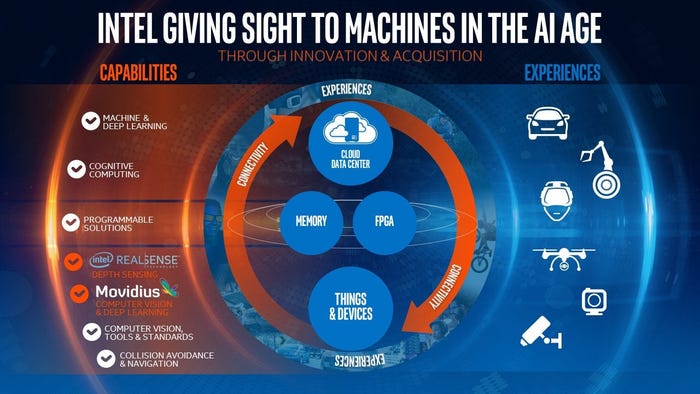Intel buys into VR and computer vision and drones with Movidius
US chip giant Intel is continuing its diversification drive with the acquisition of computer vision specialist Movidius for an undisclosed sum, to boost its VR and drone capabilities.
September 6, 2016

US chip giant Intel is continuing its diversification drive with the acquisition of computer vision specialist Movidius for an undisclosed sum, to boost its VR and drone capabilities.
Intel has been desperate to hedge its bets beyond the PC and server chip sectors for some time, with its bid to take on ARM in the mobile space famously not going as well as it would have hoped. At its recent IDF event Intel went big on AI and general futuristic cleverness, also announcing a bunch of tools for its RealSense computer vision platform, a camera module designed to enable devices to perceive their immediate environment and react to it.
This is the part of the business Intel has in mind for Movidius, where the combined technologies will be used to make things like drones, virtual reality, robots, etc cleverer. More broadly, as you can see from the Intel slide below, this fits into ‘things’ as opposed to ‘cloud’ which seems to be how Intel broadly subdivides its business these days.

We see massive potential for Movidius to accelerate our initiatives in new and emerging technologies,” blogged GM of Intel’s New Technology Group Josh Walden. “The ability to track, navigate, map and recognize both scenes and objects using Movidius’ low-power and high-performance SoCs opens opportunities in areas where heat, battery life and form factors are key.
“Specifically, we will look to deploy the technology across our efforts in augmented, virtual and merged reality (AR/VR/MR), drones, robotics, digital security cameras and beyond. Movidius’ market-leading family of computer vision SoCs complements Intel’s RealSense offerings in addition to our broader IP and product roadmap.
“Computer vision will trigger a Cambrian explosion of compute, with Intel at the forefront of this new wave of computing, enabled by RealSense in conjunction with Movidius and our full suite of perceptual computing technologies.”
Interesting choice of analogy there Josh. The Cambrian explosion was a primordial event during which the evolution of life on earth significantly accelerated and prior to which only the most primitive organisms existed. Considering Intel has been one of the most significant companies of the computing industry to date, the inference that it presided over a period that amounts to little more than Proterzoic slime is a tad unfortunate.
“When computers can see, they can become autonomous and that’s just the beginning,” wrote Movidius CEO Remi El-Ouazzanne. “We’re on the cusp of big breakthroughs in artificial intelligence. In the years ahead, we’ll see new types of autonomous machines with more advanced capabilities as we make progress on one of the most difficult challenges of AI: getting our devices not just to see, but also to think.”
Impressive claims, if a bit portentous in a Terminator/Matrix kind of way. Movidius had previously been working with the likes of Google on bringing AI and computer vision to mobile devices and this could be a way for Intel to get back into that game through another route. It’s certainly not being shy on the M&A front, but piecing all these components together into a coherent AI/VR/[insert futuristic abbreviation here] proposition won’t be easy.
About the Author
You May Also Like












_1.jpg?width=300&auto=webp&quality=80&disable=upscale)
